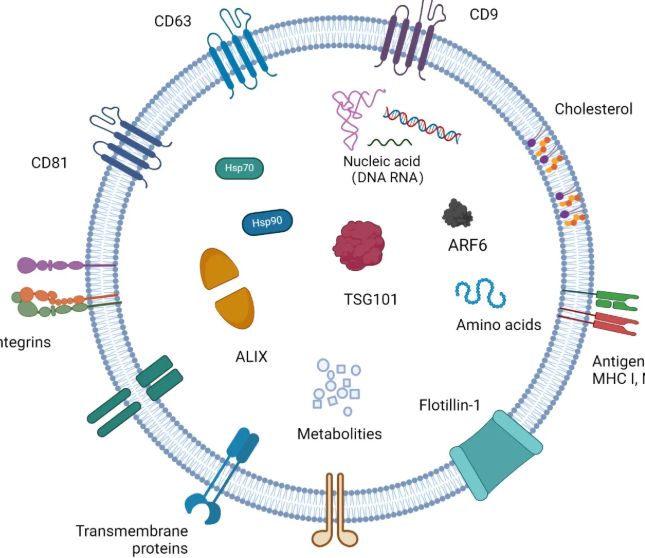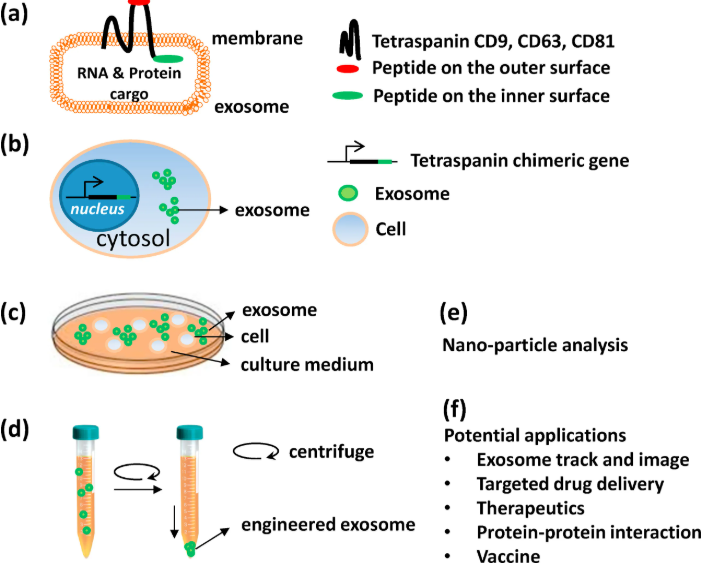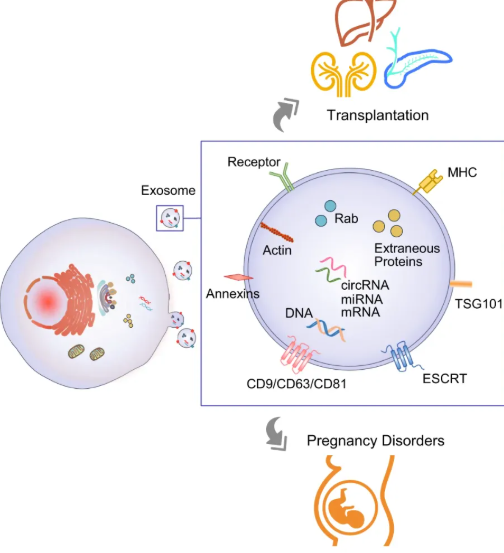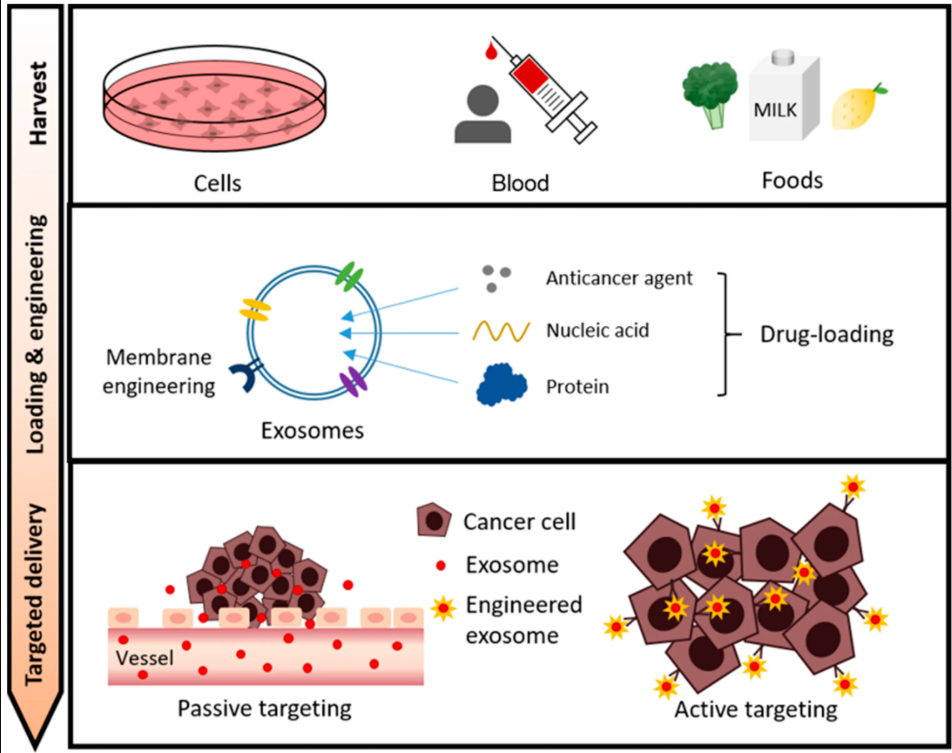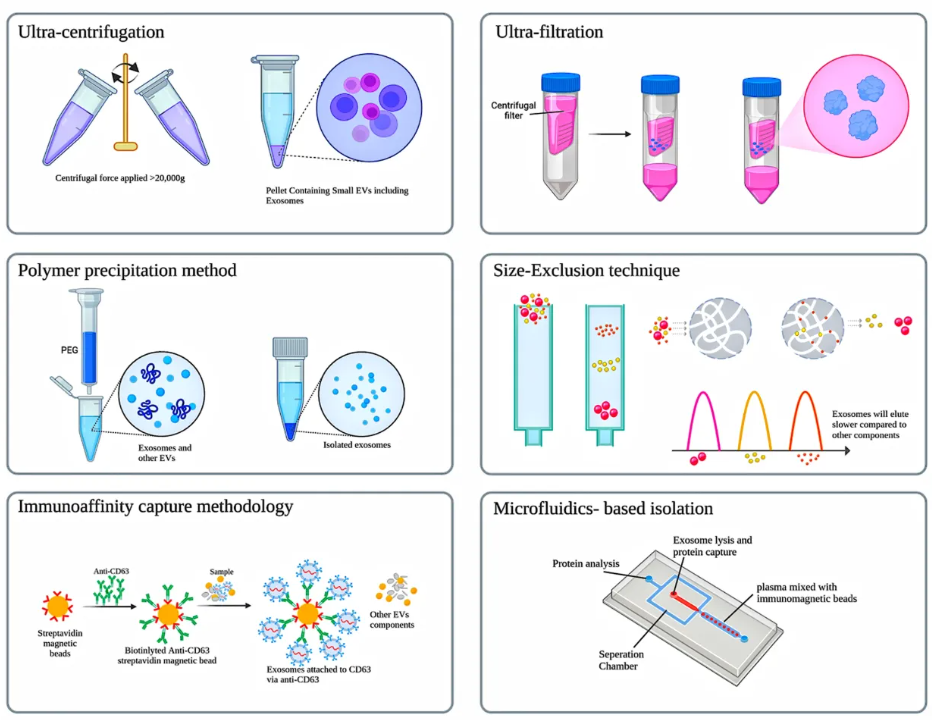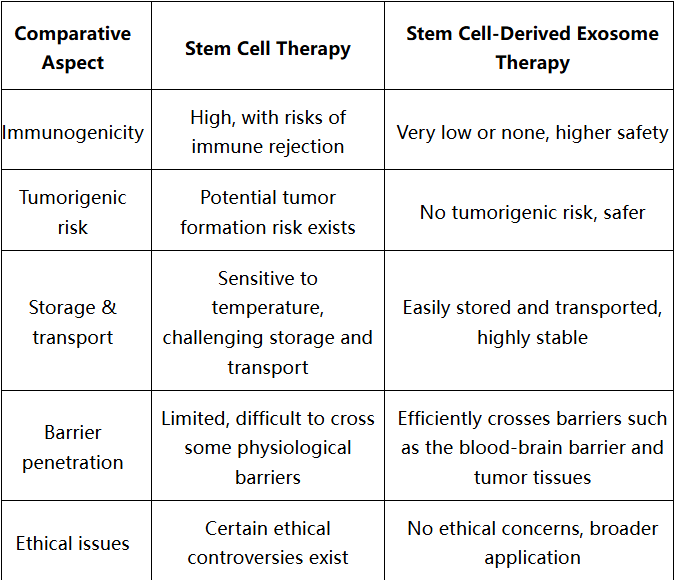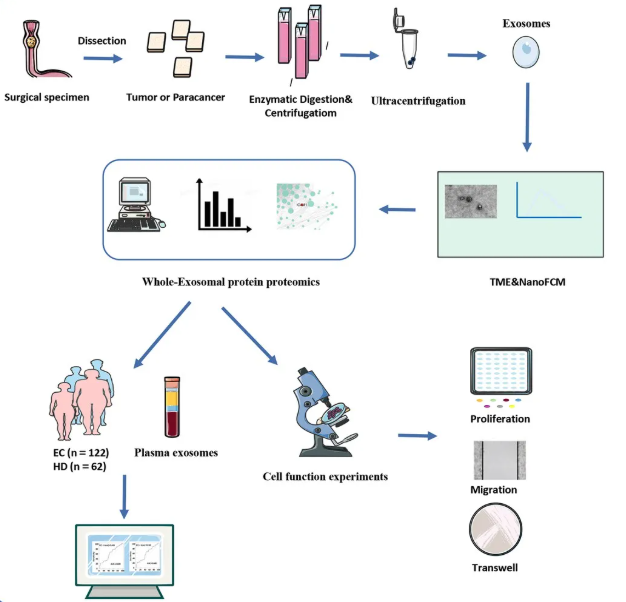Exosome Application
- Efficient isolation of exosomes from various biological sources, including body fluids, tissues, and cell culture supernatants.
- Advanced purification techniques such as ultracentrifugation, size-exclusion chromatography (SEC), Microfluidics technology, and immunoaffinity-based methods to ensure high purity and yield.
- Morphological and size distribution analysis using transmission electron microscopy (TEM) and nanoparticle tracking analysis (NTA).
- Surface marker profiling through flow cytometry and Western blot analysis.
- Comprehensive molecular profiling, including exosomal proteomics, lipidomics, metabolomics, and RNA sequencing.
- Surface modification strategies, such as ligand conjugation or antibody coating, for targeted delivery applications.
- Exosome cargo loading using active (electroporation, sonication) and passive (co-incubation) approaches for delivering nucleic acids, proteins, or small molecules.
- Development of engineered exosomes with enhanced stability, biocompatibility, and therapeutic efficacy.
- Customizable exosome modifications tailored to specific diagnostic and therapeutic applications.
- Cellular uptake studies to evaluate exosome internalization efficiency and targeting specificity.
- Bioactivity assessment through in vitro functional assays, including proliferation, apoptosis, migration, and immune response modulation.
- Biodistribution and pharmacokinetics studies to track exosome fate in vivo.
- Evaluation of exosome-mediated drug delivery efficiency and therapeutic effects in disease models.
Exosomes are nanoscale extracellular vesicles secreted by various cell types. They play a fundamental role in intercellular communication by transferring proteins, nucleic acids, lipids, and metabolites. These vesicles, enclosed by a lipid bilayer, are present in various biological fluids, including but not limited to blood, urine, saliva, and cerebrospinal fluid, making them invaluable for biomedical research, diagnostics, drug delivery, and regenerative medicine. MtoZ Biolabs offers a comprehensive service platform for Exosome Applications, supporting researchers and biotechnology companies in harnessing exosome engineering for diagnostics, therapeutics, and precision medicine.
Service at MtoZ Biolabs
Exosome Applications
1. Exosomes as Biomarkers for Disease Diagnosis
Exosomes serve as highly specific biomarkers for disease detection due to their ability to reflect the molecular and proteomic landscape of their cells of origin. Their stability in body fluids, including blood, urine, cerebrospinal fluid, and saliva, makes them ideal non-invasive diagnostic tools. Advanced liquid biopsy techniques leverage exosomal RNA, DNA, and proteins to detect early-stage diseases such as cancer, neurodegenerative disorders, and cardiovascular diseases. High-throughput mass spectrometry (LC-MS/MS), next-generation sequencing (NGS), and microfluidic platforms allow for precise characterization of exosomal cargo, enabling real-time disease monitoring and personalized medicine strategies. MtoZ Biolabs provides comprehensive exosome profiling and biomarker discovery services, supporting researchers in identifying disease-specific exosomal signatures for early diagnosis and prognosis.
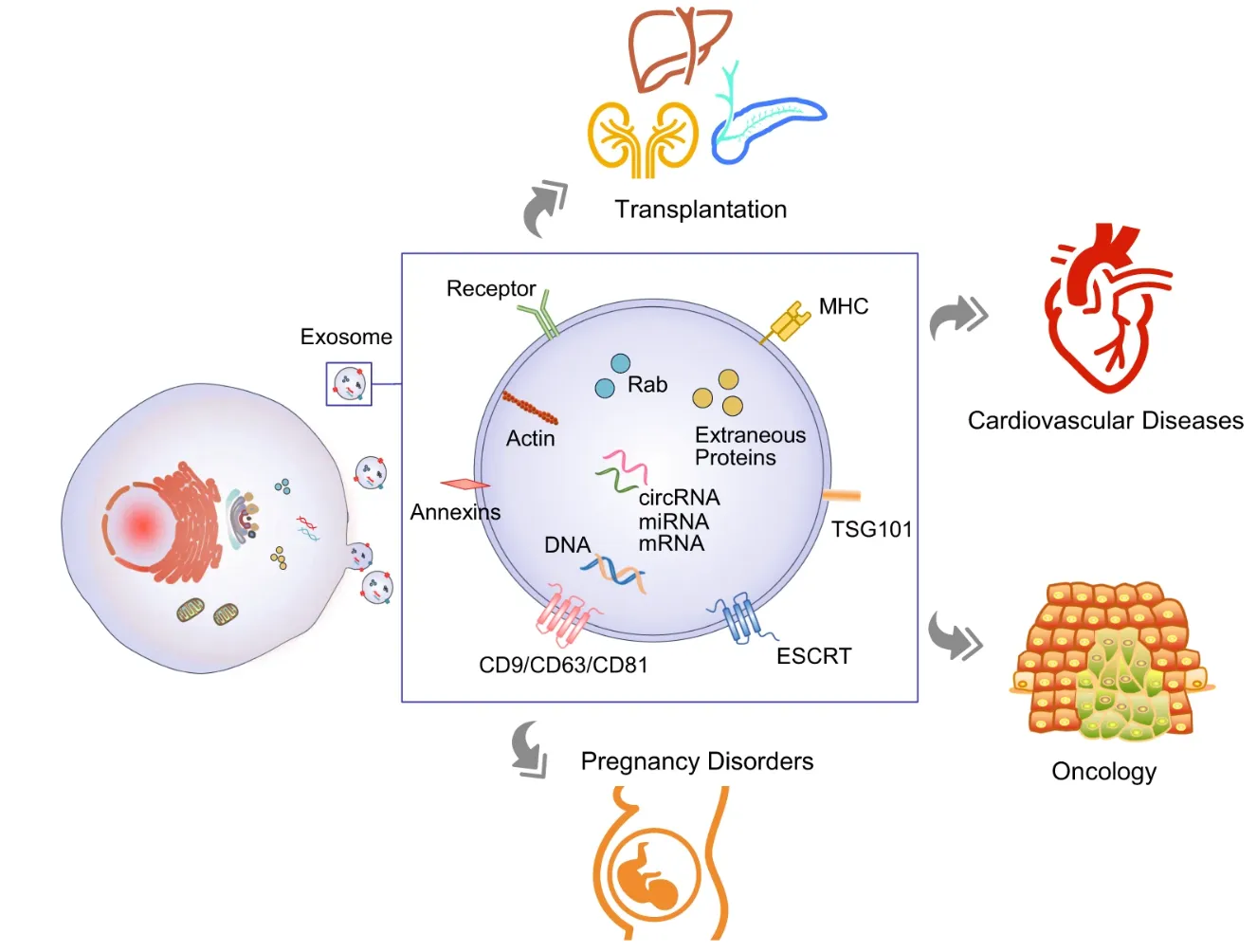
Zhou, B. et al. Signal Transduct Target Ther. 2020.
Figure 1. Application of Exosomes as Liquid Biopsy
2. Exosome-Based Targeted Therapy
As natural intercellular communication vehicles, exosomes have emerged as biocompatible, immune-tolerant carriers for therapeutic molecules. Their intrinsic targeting ability, coupled with engineered surface modifications, allows for precise delivery of therapeutics to disease sites, including tumors and inflammatory lesions. CRISPR/Cas9 gene editing tools, siRNA, miRNA, and protein therapeutics can be encapsulated within exosomes and delivered to specific cells with minimal off-target effects. This approach is particularly promising in oncology, where exosome-based drug carriers can selectively deliver chemotherapeutics or gene-silencing molecules to cancer cells, bypassing normal tissues and reducing systemic toxicity. MtoZ Biolabs specializes in exosome engineering, ligand modification, and targeted drug loading, offering tailored solutions for researchers developing next-generation targeted therapies.
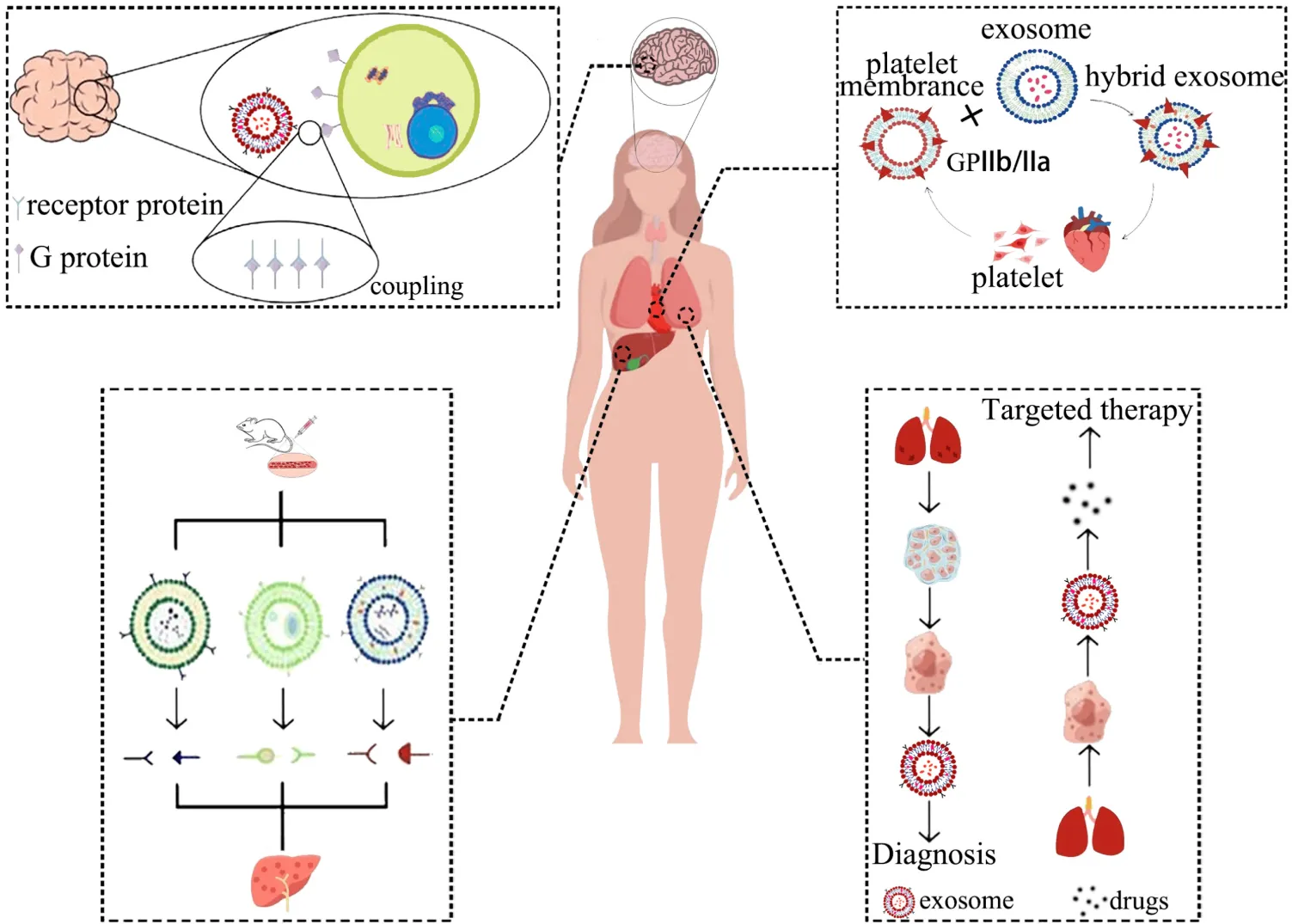
Zeng H. et al. Cells. 2023.
Figure 2. Strategies for Targeting Exosomes to Tissues in Vivo
3. Exosomes as Drug Delivery Vehicles
Exosomes offer distinct advantages over synthetic nanocarriers due to their natural biocompatibility, stability, and ability to evade immune detection. Their lipid bilayer allows efficient encapsulation and delivery of small molecules, nucleic acids, and proteins to target cells while minimizing systemic toxicity. Notably, exosomes can cross biological barriers, including the blood-brain barrier (BBB), making them a promising platform for neurological drug delivery. Engineering strategies, such as surface modification with targeting ligands and cargo loading via electroporation or fusion methods, enhance exosome specificity and therapeutic efficacy. By leveraging advanced isolation technologies such as ultracentrifugation, size-exclusion chromatography (SEC), and affinity chromatography, high-purity, high-yield exosome preparations can be achieved. MtoZ Biolabs provides customized exosome-based drug delivery solutions, optimizing cargo loading, targeting efficiency, and stability, facilitating the development of next-generation biotherapeutics.
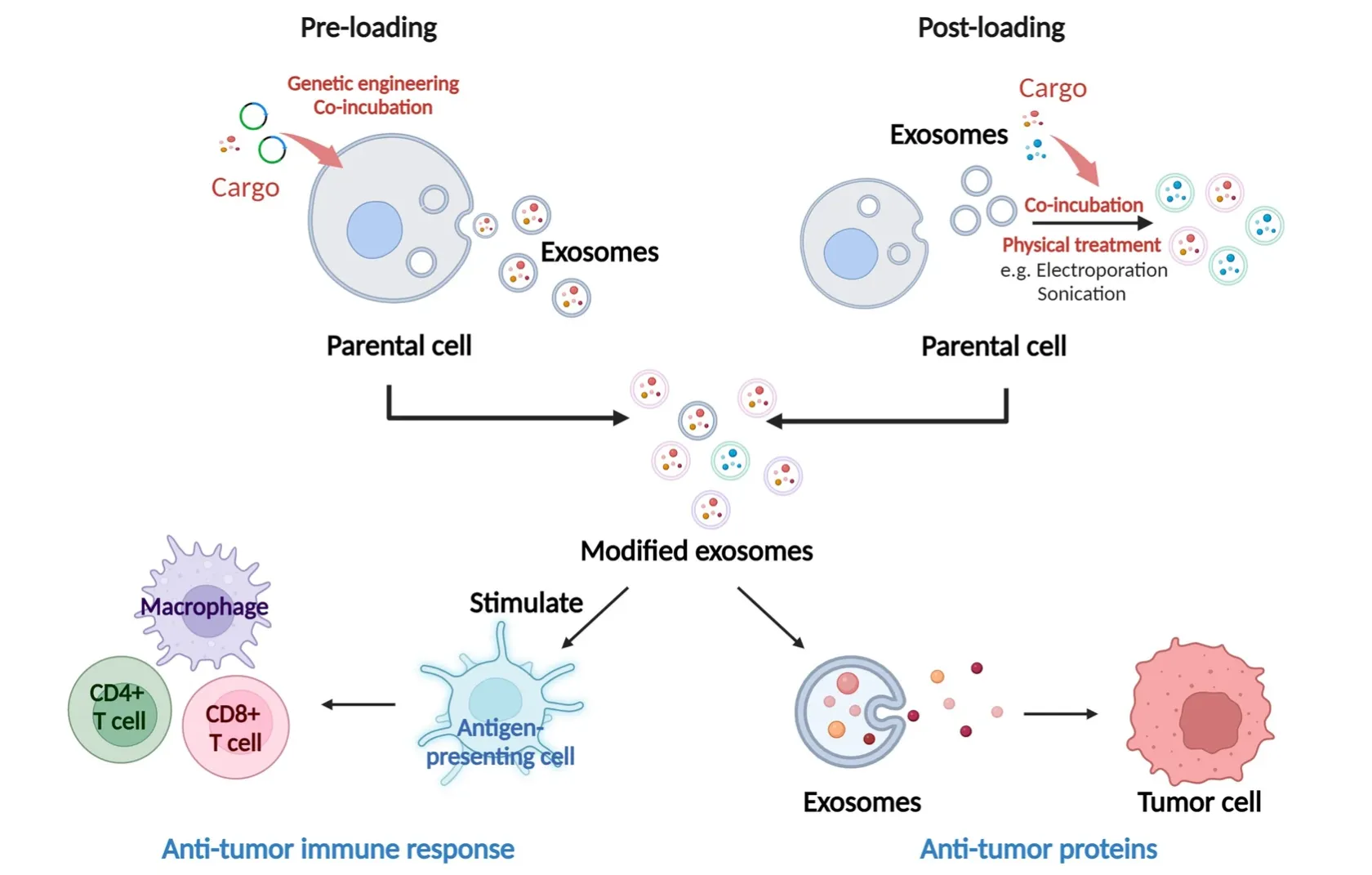
Figure 3. Exosome Engineering Strategies for Loading Cancer Therapeutic Cargo into Exosomes
4. Exosome Applications in Regenerative Medicine
Exosomes secreted by stem cells and immune cells play a pivotal role in tissue repair, immune modulation, and cell regeneration. They contain growth factors, cytokines, and bioactive RNAs that enhance wound healing, bone regeneration, and neuroprotection. Mesenchymal stem cell (MSC)-derived exosomes have demonstrated therapeutic potential in degenerative diseases, ischemic injuries, and autoimmune disorders by modulating inflammatory responses and promoting cell proliferation. These vesicles serve as cell-free alternatives to stem cell therapy, reducing immune rejection and ethical concerns. MtoZ Biolabs offers high-purity MSC-derived exosome isolation, functional characterization, and bioactivity validation, supporting research in regenerative medicine, tissue engineering, and cell-free therapies.
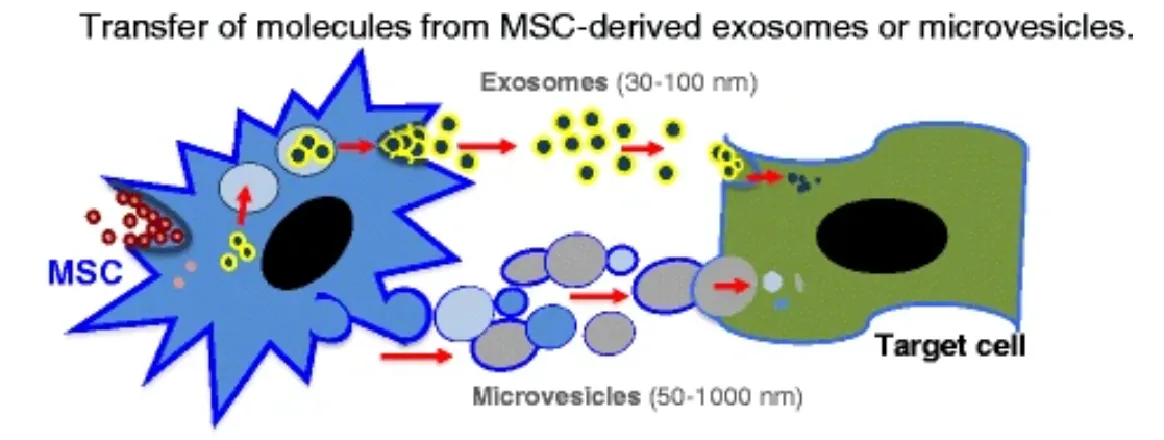
Figure 4. MSCs Rescue and/or Repair Injured Cells and Tissues by Transferring Proteins/Peptides, RNA, Hormones, and/or Chemicals via Extracellular Vesicles such as Exosomes or Microvesicles
Services at MtoZ Biolabs
1️⃣Exosome Isolation and Purification Services
2️⃣Exosome Characterization Services
3️⃣Exosome Engineering Services
4️⃣Exosome Functional Assay Services
Why Choose MtoZ Biolabs?
☑️End-to-End Workflow
Delivering a fully integrated platform covering exosome isolation, functional characterization, data analysis, and customized reporting to streamline research and clinical applications.
☑️Tailored Solutions
Customizable exosome engineering and functionalization services to meet distinct research and therapeutic needs.
☑️Advanced Isolation Technologies
Utilizing optimized ultracentrifugation, size-exclusion chromatography, and affinity-based approaches to efficiently isolate exosomes from diverse biological sources.
☑️Comprehensive Exosomal Analysis
Offering in-depth characterization of exosomal lipids, proteins, and RNAs through lipidomics, proteomics, metabolomics, and RNA sequencing.
☑️Exosome Tracking and Biodistribution
Providing multiple labeling strategies for real-time in vivo tracking, biodistribution studies, and kinetic analysis.
Exosomes are revolutionizing modern biomedical sciences, offering non-invasive diagnostics, precise drug delivery, and regenerative therapies. MtoZ Biolabs provides end-to-end solutions to support pharmaceutical, biotechnology, and academic clients in harnessing the full potential of exosomes for scientific discovery and clinical translation. Contact us today to explore how our exosome applications services can accelerate your research and development needs.
How to order?







